Is wireless charging bad for battery? This burning question has perplexed many smartphone users, who strive to find a convenient and efficient way to power up their devices. Well, the short answer is no, wireless charging is not inherently bad for your battery. In fact, it can be a game-changer in terms of convenience and eliminating the need for pesky wires. However, as with any technology, there are a few nuances to be aware of to ensure you’re getting the most out of your wireless charging experience. So, let’s dive into the details and explore the ins and outs of wireless charging and its impact on battery life.
Is Wireless Charging Bad for Battery?
The Rising Popularity of Wireless Charging
In recent years, wireless charging has gained immense popularity as a convenient and hassle-free way to charge our devices. Instead of relying on traditional wired chargers, wireless charging allows us to simply place our smartphones, smartwatches, or other compatible devices on a charging pad or dock and have them recharge without the need for cables. While it offers undeniable convenience, some people have concerns about the impact of wireless charging on the battery life and overall health of their devices. In this article, we’ll examine the question: Is wireless charging bad for battery?
Understanding Wireless Charging Technology
Wireless charging, also known as inductive charging, utilizes electromagnetic fields to transfer energy between the charger and the device being charged. The charging pad or dock contains a coil that generates an alternating current, creating a magnetic field. When the device with a compatible receiver coil is placed on the charging surface, the magnetic field induces an electric current within the device, which is then converted into direct current to charge the battery.
The Impact of Heat on Battery Health
One of the concerns surrounding wireless charging is the potential heat generated during the charging process. Heat is known to be an enemy of battery health and can accelerate degradation. When a device is wirelessly charged, some heat is inevitably produced due to energy transfer and conversion processes. However, modern wireless charging technologies have made significant strides in minimizing heat generation.
Advancements in Wireless Charging Efficiency
Wireless charging efficiency has dramatically improved over the years, resulting in reduced heat generation. The Wireless Power Consortium’s Qi standard, the most widely adopted wireless charging standard, ensures that chargers and devices adhere to guidelines that optimize energy transfer and minimize energy loss. This standard helps prevent excessive heat buildup that could harm the battery life.
Avoiding Excessive Heat Buildup
To further mitigate the heat generated during wireless charging, manufacturers integrate various mechanisms into devices and charging pads. These mechanisms include temperature sensors, advanced power management systems, and heat dissipation techniques. When a device reaches a certain temperature threshold, wireless charging may be slowed down or temporarily halted to prevent overheating. These measures help protect the battery from excessive heat that could potentially reduce its lifespan.
Battery Longevity and Charging Habits
While wireless charging does generate some heat, it is important to note that heat is not the sole factor affecting battery longevity. How we use and charge our devices also plays a significant role. Here are a few charging habits that can impact battery health:
Avoid Deep Discharges and Frequent Full Charges
Lithium-ion batteries, commonly used in smartphones and other portable devices, work best when they are not consistently drained to very low levels or charged to 100% repeatedly. Instead, it is recommended to keep the battery level between 20% to 80% for optimal longevity. Regularly deep discharging or frequently charging to full capacity can lead to increased battery wear over time, regardless of whether it is done wirelessly or via a wired connection.
Charging Speed and Battery Stress
Another factor to consider is the speed at which a device charges. Fast charging technologies, whether wireless or wired, can generate more heat due to the higher energy transfer rate. While fast charging is convenient, using it consistently may put additional stress on the battery and result in faster degradation. If battery longevity is a top priority, it may be beneficial to opt for slower charging speeds whenever possible.
Avoid Extreme Temperatures
Extreme temperatures, both hot and cold, can have adverse effects on battery health. Prolonged exposure to high temperatures, such as leaving a device in direct sunlight or inside a hot car, can accelerate battery degradation. Similarly, charging a device in extremely cold conditions may impact its charging efficiency and overall performance. It is advisable to charge devices in ambient temperatures and avoid exposing them to extreme heat or cold.
Wireless Charging vs. Wired Charging
To fully explore the question of whether wireless charging is bad for the battery, it is essential to compare it to its wired counterpart. While wireless and wired charging have their pros and cons, both methods can be utilized without significant negative impacts on battery health if used appropriately. Here are some key considerations when comparing wireless and wired charging:
Convenience and Wear and Tear
Wireless charging eliminates the need for constantly plugging and unplugging cables, reducing wear and tear on the charging port of the device. Over time, frequent use of wired charging can result in a loose or damaged charging port, requiring expensive repairs. Wireless charging, on the other hand, minimizes this risk and helps prolong the overall lifespan of the device.
Energy Efficiency and Environmental Impact
Wireless charging systems have made significant advancements in energy efficiency, achieving levels comparable to wired charging. However, it is worth noting that wireless charging may still have some energy loss due to electromagnetic induction processes. Wired charging, on the other hand, boasts higher efficiency as the direct connection between the charger and device minimizes energy loss.
From an environmental perspective, wireless charging can potentially reduce electronic waste. With the increasing adoption of wireless charging, fewer cables and wall adapters may be needed, resulting in less e-waste over time.
Charging Flexibility and Range
Wired charging provides more flexibility in terms of mobility during charging. Users can plug in their devices and continue using them while maintaining a continuous power supply. On the other hand, wireless charging requires the device to be placed on a charging pad or dock, limiting mobility during charging. However, a growing number of wireless charging stations and surfaces are being integrated into various environments, including coffee shops, airports, and vehicles, offering greater convenience and charging flexibility.
Optimizing Wireless Charging for Battery Health
To ensure wireless charging has minimal impact on battery health, here are some tips to optimize the charging process:
Use Reliable Wireless Charging Accessories
Investing in reputable wireless charging pads and docks that comply with established standards, such as the Qi standard, ensures optimal wireless charging performance. High-quality chargers are designed to follow best practices to mitigate excessive heat generation and protect the battery during charging.
Avoid Thick Cases or Metal Objects
When wirelessly charging a device, ensure that there are no thick cases or metal objects between the device and the charging pad. These obstructions can interfere with the charging efficiency, leading to increased heat generation or even preventing charging altogether.
Maintain Moderate Charging Speeds
Although fast charging is convenient, consider using slower charging speeds when possible to reduce heat generation and stress on the battery. Many wireless chargers offer adjustable charging speeds, allowing users to strike a balance between convenience and battery health.
In conclusion, wireless charging itself is not inherently bad for battery health. Modern wireless charging technologies have significantly improved in terms of efficiency, heat management, and overall battery protection. While heat generation remains a concern, manufacturers have implemented various mechanisms to minimize its impact and protect the battery from long-term damage.
Ultimately, battery health and longevity depend on a combination of factors, including charging habits, temperature conditions, and the quality of the charging accessories. By understanding these factors and adopting good charging practices, wireless charging can be safely and effectively utilized without significant negative impacts on battery life.
Frequently Asked Questions
Does wireless charging damage the battery of my device?
Wireless charging does not inherently cause damage to the battery of your device. However, the way you use wireless charging and the specific charging pad you use can affect the battery’s overall lifespan.
Does wireless charging generate more heat compared to wired charging?
Wireless charging does tend to generate slightly more heat compared to wired charging. This is because the energy transfer involves electromagnetic induction, which inherently leads to some energy loss in the form of heat. However, modern wireless charging technologies are designed to minimize heat generation and prevent damage to the battery.
Does wireless charging affect the charging speed of my device?
Wireless charging typically has a slightly slower charging speed compared to wired charging. This is because wireless charging pads generally have a lower power output compared to wired chargers. However, the charging speed difference is minimal and may not be noticeable in day-to-day usage.
Can wireless charging overcharge my device’s battery?
No, wireless charging systems are designed to prevent overcharging. Once your device reaches the full charge, the charging pad automatically stops supplying power. This helps protect the battery from overcharging, ensuring its longevity.
Is it safe to leave my device on a wireless charger overnight?
It is generally safe to leave your device on a wireless charger overnight. Modern wireless charging systems have built-in safety features to prevent overcharging, overheating, and other potential issues. However, it is always a good practice to use a reputable wireless charger and follow the manufacturer’s guidelines for optimal safety.
Can wireless charging cause my device’s battery to degrade faster?
Wireless charging itself does not cause faster battery degradation. However, if the charging pad you are using does not have proper heat dissipation or if it generates excessive heat during charging, it can potentially contribute to faster battery degradation over time. It is recommended to use high-quality wireless chargers that are known to have efficient heat management systems.
Final Thoughts
Wireless charging is a convenient and popular method for powering up our devices without the hassle of cables. However, there are concerns about its impact on battery health. Studies suggest that wireless charging can generate more heat and induce higher voltage stress, which may degrade battery capacity over time. Nevertheless, with advancements in technology, manufacturers are addressing these issues and implementing measures to mitigate potential drawbacks. By using reputable charging pads and following manufacturer guidelines, the impact of wireless charging on battery life can be minimized. So, is wireless charging bad for the battery? While there are potential drawbacks, proper usage and adherence to recommended practices can help preserve battery health in the long run.



